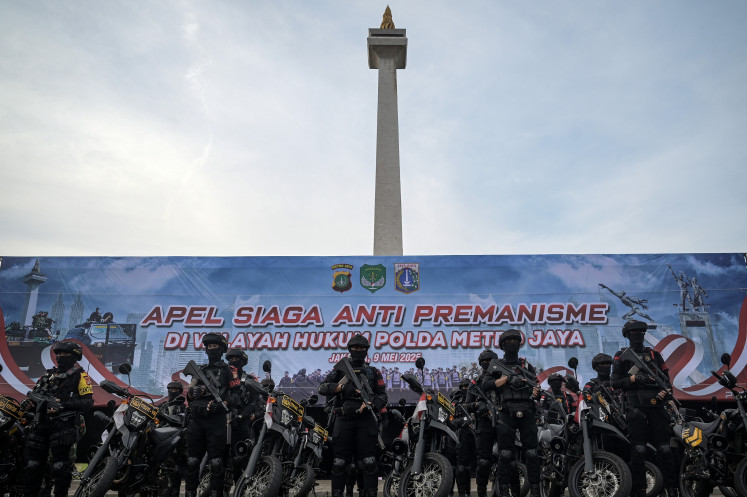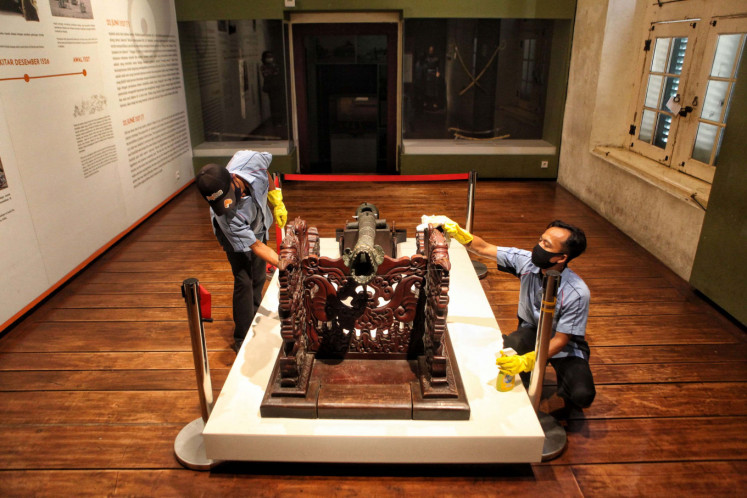Indonesia denies giving orders to send waste to Asian countries
The government has denied a claim made by environmental groups alleging it had reexported containers of hazardous waste to other countries in Asia rather than sending them back to their countries of origin
Change text size
Gift Premium Articles
to Anyone

T
he government has denied a claim made by environmental groups alleging it had reexported containers of hazardous waste to other countries in Asia rather than sending them back to their countries of origin.
The claim was made in a report issued recently by Indonesian environmental group Nexus3 and global waste trade watchdog Basel Action Network. In it, the groups alleged that the government sent containers of contaminated scrap materials to India and other countries.
Of at least 58 containers meant to be sent back to the United States, 38 of them were diverted to India, the groups found. Meanwhile, three containers were sent to South Korea and one container each went to Thailand, Vietnam, Mexico, the Netherlands and Canada. Only 12 containers were returned to the US.
The groups also reported that the 58 containers were reexported from various importers in East Java, including paper mills that had imported recycled paper but instead received papers mixed with plastic scraps.
The environmental watchdogs alleged that the government defied its commitment to the Basel Convention, an international treaty that controls the movement of hazardous waste between countries. The convention, ratified by Indonesia, stipulates a provision on returning imported hazardous waste to its country of origin.
The Finance Ministry’s customs and excise director general, Heru Pambudi, said on Thursday that there were two East Java recycling companies responsible for making deliveries to seven countries that did not initially export the hazardous waste.
“The government never issued any recommendation or letters that allowed for the contaminated waste to be reexported to other Asian countries.”
However, the paper recycling companies, PT Mega Surya Eratama (MSE) and PT Surabaya Mekabox (SM), had both filled out their reexport documents accordingly, with MSE ordering for 38 containers to be sent to the US and SM sending 20 containers to Germany.
“According to our observations, some of the returned containers have yet to arrive in their countries of origin, including the US, as they are still being held in Singapore, Malaysia or Thailand,” Heru said.
“The government never issued any recommendation or letters that allowed for the contaminated waste to be reexported to other Asian countries.”
The Environment and Forestry Ministry’s director general of waste and hazardous and toxic material management, Rosa Vivien Ratnawati, said the government refused to accept imports of material contaminated with hazardous waste.
“We are working with the customs office to send back the imported materials to their countries of origin,” she said.
According to data from the Customs and Excise Office, authorities held 2,194 containers at several ports across the country as of Wednesday. They suspected the containers, imported from numerous countries around the world, were filled with scrap paper and plastic that had been contaminated with other waste.
The imported scrap materials were intended to be used by recycling companies in Indonesia. However, in some cases the scrap materials were contaminated with hazardous waste, such as diapers and plastics, which could not be processed by industries and eventually ended up as garbage in landfills.
Of the 2,194 containers, 374 were sent back to their countries of origin, such as France, Germany, the Netherlands and the United Kingdom.
Rosa said the government would follow up on the reports of improper shipments as required under the Basel Convention. “We will also coordinate with the Foreign Ministry if things aren’t going well.”
Yuyun Ismawati of Nexus3 said the government had yet to make a clear statement on whether they had returned the containers or just reexported them.
“It is possible that the government only got the contaminated containers out of the country rather than returning them to their countries of origin,” Yuyun said.
“Reports are saying that the origin countries […] had yet to receive notifications of reexport from Indonesia even though the convention requires that Indonesian authorities do so. We suspect the government never intended to return the containers of contaminated [waste].”
The convention stipulates that the reexport of hazardous waste should be done within 90 days of when the importing country notifies the country of origin and convention secretariat.
Rosa dismissed the concern: “The reexport of the contaminated waste follows the business-to-business scheme that is not regulated by the Basel Convention; therefore, we didn’t need to notify the destination countries first.”









